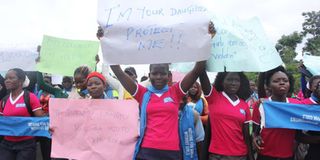Sexism, poverty, and power: Why gender equality in Kenya remains a distant dream

Young women protest against the rise in sexual and gender-based violence.
What you need to know:
- Myllene Bosibori's political journey exposes deep gender, ethnic, and financial barriers facing Kenyan women candidates.
- Sexual harassment, biased systems, and economic hardship continue to block women’s fair access to political leadership.
When Myllene Bosibori decided to run for Kajiado North MP in 2022, she never thought it would be an uphill task.
However, her experience was not horrifying. Having come from the minority ethnic group, Myllene tells the Nation that she faced double discrimination of coming from a small ethnic group and being a woman. She recounts how on many occasions she was told to go seek elective politics in her native Kisii region.
Myllene also bitterly recalls how she was asked for sexual favours and a bribe to be given a ticket for one of the popular political parties. “When I refused, it was handed to another person. It is so hard for a woman seeking political leadership to fairly compete with men.”
Read: Culture or progress? How women are redefining 'traditional' values without losing their heritage
She operated a cereals shop in Ongata Rongai. However, she closed up shop after using all the money from the business in the campaigns. “I had nothing left when the elections were over. I had nothing left. I had closed my shop and had no penny left. I had to be hosted by a friend for eight months as I could not afford rent.”
Myllene's story mirrors those of many other women seeking political leadership. High cost of elections, gender discrimination, sexual harassment and punitive cultural norms that entrench patriarchy are some of the main factors derailing women’s political participation. As a result, the number of women in leadership remains low. The challenges lock many of them out of the decision table.
This sad reality is contained in the Gender Snapshot 2024, which shows that none of the indicators and sub-indicators of Sustainable Development Goal 5 on gender equality are being met. The report indicates that gender parity in parliaments remains a distant dream, potentially not achievable until 2063.
In Kenya, women’s political participation remains low. According to the analysis of the elections done by the National Gender and Equality Commission after the 2022 General Election, of the 290 constituencies, less than 30 women MPs were elected. In the Senate, only three women were elected in the 47 counties.
Read: The stark reality of gender inequality separating Kenyan girls from the world's most equal nation
Even if 2022 marked the highest number of women to ever be elected, the two thirds gender principle has yet to be adhered to in elective positions, despite affirmative action. It reveals that the world will still take a staggering 137 years to lift all women and girls out of poverty. And about one in five girls continues to be married as children. The survey shows that countries with domestic violence legislation have lower rates of intimate partner violence at 9.5 per cent compared to 16.1 per cent for those without.
Gender-based violence (GBV)
According to the United Nations Office on Drugs and Crime report, 725 reported cases of femicide were reported in 2024 in Kenya, translating into a rate of 2.66 per 100,000 women. Every week, 47 women are killed in Kenya. About 75 per cent of these killings were committed by someone known to the victims such as an intimate partner, relative or friend, the report shows. Globally, the report adds that every 11 minutes, a woman was killed.
Nairobi Women Hospital CEO Sam Thenya recently observed that femicide is not a government but societal issue. Describing the situation as a national crisis, he revealed that gender violence recovery centres that his hospital runs record an average of 4,000 GBV cases every month.
The Gender Snapshot 2024 is generated by UN Women and the United Nations Department of Economic and Social Affairs. It, however, reveals that progress has been made worldwide on gender equality and women’s and girls’ empowerment. Women now hold one in every four parliamentary seats, a significant rise from a decade ago. The share of women and girls living in extreme poverty has, however, dipped below 10 per cent following steep increases during the Covid-19 years.
Up to 56 legal reforms have been enacted worldwide to close the gender gap since the first Gender Snapshot. During the Summit of the Future that took place in September last year, world leaders were challenged to forge international consensus to close the gender gap, achieve gender equality, and advance the empowerment and rights of all women and girls.
“Today’s report reveals the undeniable truth: progress is achievable, but is not fast enough. We need to keep pushing forward for gender equality to fulfil the commitment made by world leaders in the Fourth World Conference on Women held in Beijing almost 30 years ago and the 2030 Agenda,” said Sima Bahous, the UN Women executive director.
Ms Bahous called for unity to dismantle the barriers women and girls face and forge a future where gender equality is not just an aspiration but a reality.
Daisy Amdany, the executive director of Crawn-Trust, says progress towards gender equality has been made in Kenya, more so since the enactment of the Constitution. She notes that there have been notable achievements, particularly in Kenya, including the enactment of laws and policies to protect women’s rights and promote gender equality. She says the Constitution gives women equal status and rights as their male counterparts, something they did not have before 2010.


